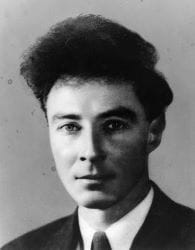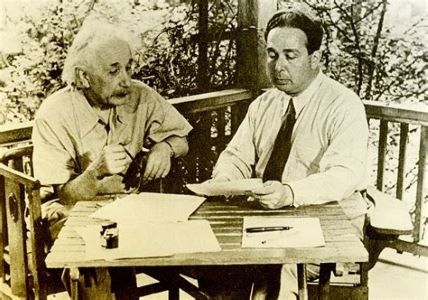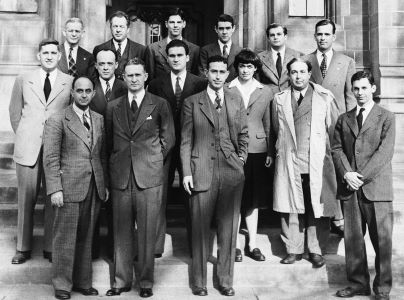Oppenheimer, Szilard, and Electricity

I caught the end of the Oscars. Funny, growing up it seemed such a monumental event. In 1960, almost half of America watched the then Academy Awards, Sunday night only 5% watched the Oscars. The show was once a cultural event, such that you can ever say American culture. Certainly, it was an overwhelming display of technological power. In 1960, there were only three television channels and film production and distribution remained controlled by a handful of oligopolistic Hollywood corporations.
I've always been a movie fan. Over the years, I've come to expect, at best, nothing more than to be half-entertained. If a movie is actually well written, or written at all, that's a plus. I was intrigued a couple years ago when they announced they were making a movie about Oppenheimer, but didn't expect much. I wrote in a review this summer, “The ‘Oppenheimer’ movie is OK, entertaining. ...but as a story on science and technology, at a time when it's more important than ever for the world to understand both, it’s woefully lacking.”
Hollywood is best staring in a mirror of beautiful of images and reflecting them back, anything beyond that is exceptional. When they perceive they have done so, there's a plenty of self-congratulatory backslapping. Over the last few months much talk percolated about “Oppenheimer” winning Oscars. I wondered if anyone on the show would say anything about nuclear politics, after all, a little politics was always the most entertaining spectacle in any Oscars’ show.
Only the Irish guy said anything, the sentiment appreciated:
“We made a film about the man who created the atomic bomb and for better and worse we're all living in Oppenheimer's world. So, I'd really like to dedicate this to the peacemakers everywhere.”
You have a hard time finding the children of god anywhere in the US these days, most especially in Hollywood or DC. As far as “Oppenheimer's world,” its nice poetry, but not particularly accurate or helpful. If he was still around he'd protest, not in any sense of shirking responsibility, but that the whole matter could possibly be conceived his alone or even predominately. It fits into our contemporary myth of the glorious single individual, especially in tech development, the entrepreneur as lone creator. The domineering cult of the entrepreneur justifies the hundreds of millions and billions of dollars accumulated by individuals’ control of certain technologies. But as far as providing any understanding of the endless number of people and centuries of thinking responsible for the bomb, it’s not particularly enlightening. This is in no way meant as slight of Dr. Oppenheimer's instrumental role in putting together the first bomb. (If you want to hear a wonderful talk about Oppenheimer's world, here's a lecture he gave in 1958.)
The Sun Times has a nice piece on the essential pieces of the bomb puzzle assembled in Chicago. At the University of Chicago, Enrico Fermi put together the first nuclear reaction, “the pile”, which is buried a few miles from one of my sisters' houses. The article also mentions Leo Szilard, who deserves a great deal more attention. It might be more accurate to say we live in Szilard's world.

Szilard is one of a number of physicists who appeared with the fall of the old Austro-Hungarian empire. It's a not well enough explored phenomenon how at certain places and times, a small place on the planet becomes a wellspring of human creativity. In the early 1930s, Szilard first proposed the idea of nuclear chain reactions. In 1939, he persuaded Einstein to write a letter to Roosevelt alerting him to the possibility of atomic weapons, from this letter sprung the Manhattan Project. When it was clear the Germans were done, Szilard created a petition signed by a number of physicists wanting the bomb to be demonstrated, not dropped on a city. Immediately after, he and Oppenheimer, played instrumental roles pushing legislation placing the new US nuclear technology under civilian not military control.
Amusingly, there's a military intelligence memo, yes, always a top oxymoron, from 1940 calling Fermi “a Fascist” and Szilard “pro-German,” concluding for both, “Employment for this person on secret matters not recommended.” Without either there would have been no bomb in 1945.

Why this might better be called Szilard's world is his insight on information. In 1928 he released a paper called, “On the reduction of entropy in a thermodynamic system by the intervention of intelligent beings.” The paper concerns the Second Law of Thermodynamics and the ability of energy to be manipulated by information. This idea played a fundamental role in Information Theory. Norbert Wiener writes in his seminal 1948 work Cybernetics,
“Current work on the Maxwell demon and non-equilibrium statistical mechanics is very much in this spirit. Ideas about optimal control and information theory are linked to this development. A classical expression of the second law states that the maximum (average) work extractable from a system in contact with a single thermal bath cannot exceed the free-energy decrease between the system’s initial and final equilibrium states. As illustrated by Szilard’s heat engine, however, it is possible to break this bound under the assumption of additional information available to the work-extracting agent. To account for this possibility, the second law can be generalized to include transformations using feedback control.” — ( I’ve written in more detail about these ideas.)
Szilard’s thinking was not just fundamental to nukes but the entire Tech industry. Most interesting is the idea information allows the possibility of more efficient energy use. Unfortunately, the Tech industry turned this idea on its head and instead became a bottomless energy sink, an increasingly unnatural perpetual energy machine. Information technology remains an industry, dependent on ever greater amounts of energy to power brute force compute, revealing the human utilization of information remains excruciatingly primitive.
Some, including myself, once thought information technologies could be used to restructure industrial society and in so doing become more energy efficient. Unfortunately, the opposite occurred. The Washington Post has a well worth reading article on the growing problems of Tech's unquenchable energy appetite,
“Vast swaths of the United States are at risk of running short of power as electricity-hungry data centers and clean-technology factories proliferate around the country, leaving utilities and regulators grasping for credible plans to expand the nation’s creaking power grid.”
We need a lot better thinking on how we use energy, using information to restructure many things we do. As it becomes clearer this gluttonous, grasping push for more electricity cannot be met, there will be a growing battle, particularly among Tech leviathans to secure what they can. As historically demonstrated over the last couple centuries, the ability to control energy dictates the shape of the future. We don't live in Oppenheimer's or Szilard's world, but still very much in Rockefeller's, Carnegie's, Morgan's, and P.T. Barnum's.

